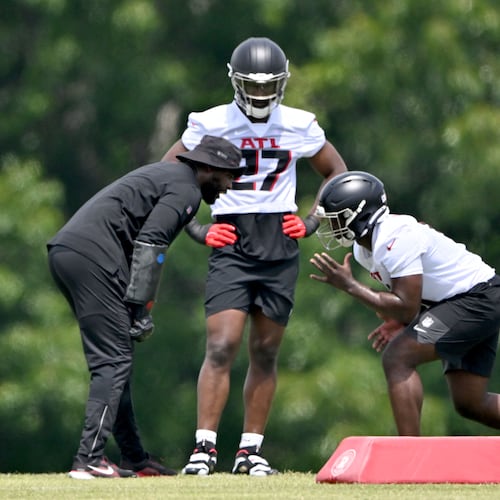Editor’s note: This is the eighth in a series looking at Falcons position groups going into the offseason.
Todd Gurley surely didn’t anticipate his homecoming heading in this direction.
After five years with the Los Angeles Rams, Gurley trekked back to the state where he first made a name for himself. In college at Georgia, Gurley became an instant star as a freshman, leading his team to the SEC Championship game, where the Bulldogs nearly knocked off Alabama. His legacy continued as a pro, having won the 2017 NFL Offensive Player of the Year before helping guide the Rams to Super Bowl LIII a year later.
With the Falcons, however, Gurley’s season did not go according to plan. The offense was unable to consistently run the ball against opponents, with Gurley getting replaced as the lead back late in the season.
Now that Falcons coach Arthur Smith has assumed lead duties, one priority will be to get the rushing attack back on track. With that in mind, here’s an early look at where things stand at running back.
Contracts expiring: Gurley signed a one-year contract worth $5.5 million last offseason, hoping to reignite his career after his sudden release from the Rams. Brian Hill, who was brought back as a restricted free agent last offseason, will be an unrestricted free agent as well.
Still under contract: Ito Smith, a fourth-round selection in 2018, will enter the final year of his rookie deal. Smith mostly has been a rotational running back, but he did get the chance to handle lead duties down the stretch of the 2020 season. Qadree Ollison, a fifth-round pick in 2019, still has two years remaining on his rookie contract.
The Falcons also signed Tony Brooks-James to a reserve/futures deal shortly after the 2020 season concluded. Fullback Keith Smith just completed the first of a three-year deal he signed last offseason.
Credit: Curtis Compton / Curtis.Compton@
Credit: Curtis Compton / Curtis.Compton@
2020 performance: The Falcons were unable to run with any manner of consistency. Only once this year did a running back total more than 100 yards in a game, which was Gurley in a Week 5 loss to the Carolina Panthers. The Falcons committed to the run game early in the season and actually had decent success through the first five weeks. After that, the production dipped suddenly and never returned to the level most teams need to win games.
The Falcons averaged only 95.8 rushing yards per game, which ranked 27th in the NFL. The Falcons’ 3.7 yards per carry average ranked 31st, one spot ahead of the Pittsburgh Steelers’ lowly average of 3.6. But when comparing those teams, the Falcons ran the ball 36 more times than the Steelers during the regular season.
Gurley ran for 678 yards and nine touchdowns, with his yardage total being a career low. Going into the Falcons’ Week 10 bye, Gurley had accounted for 584 rushing yards, meaning he tallied only 94 rushing yards in the six games he played in over the final seven weeks of the regular season. Hill finished second on the roster with 100 carries for 465 yards and a touchdown. Smith was third with 63 carries for 268 yards and a score.
Credit: Curtis Compton / Curtis.Compton@
Credit: Curtis Compton / Curtis.Compton@
Offseason outlook: Both Smith and general manager Terry Fontenot previously were with teams that paid their star running backs big contracts. The Tennessee Titans signed Derrick Henry to a four-year, $50 million deal, and the New Orleans Saints inked Alvin Kamara to a five-year, $75 million extension. That’s not to say the Falcons definitely will look to shell out some cash to a running back this offseason. But if the right player is available who fits Smith’s system, it’s not something to rule out.
Among the notable coming free-agent running backs are Aaron Jones (Packers), Chris Carson (Seahawks) and Kenyan Drake (Cardinals). Jamaal Williams (Packers) and Wayne Gallman (Giants) should deserve looks as well, especially since they probably won’t command the contracts Jones, Carson and Drake will receive.
Credit: AP
Credit: AP
2021 draft options: At the fourth overall pick, it wouldn’t be wise to draft a running back. With Fontenot stating Tuesday that his draft philosophy is to take the best player available, it’s also tough to envision a running back cracking the top four. But for the sake of argument, if a running back were in Fontenot’s top four, it’s highly probable that no other team in that vicinity will be in the market for one.
That’s where trading back could come into play, which could allow the Falcons to add a premier running back while accruing some extra picks. Alabama running back Najee Harris appears to be the most likely to go in the first round at the position. Clemson’s Travis Etienne has a good shot to go in the first round, too. After Harris and Etienne, the other running backs in this year’s class are likely slotted for the second and third days.
North Carolina’s Javonte Williams and Michael Carter and Ohio State’s Trey Sermon (Sprayberry High) also are good options at the position.
Conclusion: The Falcons are poised to add a running back, whether it’s through free agency, the draft or both. Although the offensive line didn’t have a great year, the running back position and previous coaching staff shared plenty of blame in this department. Under Smith, the run game’s woes will need to be corrected through better coaching and added backfield talent.
Previous stories in this series
Calvin Ridley’s emergence eases Falcons’ worries at wide receiver
Falcons will hope new coach turns offensive line around
Falcons seek to fill out tight end room with only one under contract
Mixed results lead to questions with Falcons’ special teams
Falcons’ defensive line needs better sack production in 2021
About the Author
Keep Reading
The Latest
Featured




